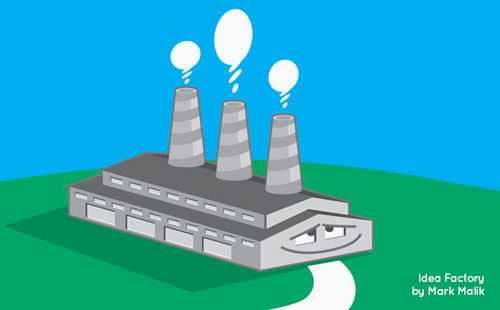Estimated reading time: 2 minutes

In business, making bad decisions is the worst thing you can do, right?
Wrong.
The worst thing you can do in business is to be indecisive. It’s better to make a bad decision quickly than a good decision once it’s too late. The more quickly you decide, and possibly fall flat, the more quickly you can learn something that will contribute to your success. The key is to become efficient at identifying which ideas have legs and which don’t.
The team at Google X* refers to this process as Rapid Evaluation, or Rapid Eval. At X, they’re less concerned with affirming great ideas and more concerned with punching holes in proposed concepts.The reasoning is simple: it’s only worth spending time investigating ideas once they’ve been thoroughly vetted.
So… if most ideas don’t hold up under scrutiny, the key to winning is generating as many ideas as possible and getting feedback. Quickly.
Here are some thoughts on how to rapidly evaluate, test and analyze like a well-oiled Idea Factory:
Scenario #1:
You have a new business concept or service
Companies that will succeed in today’s economy are those that add new value to customers. To test feasibility of your idea, put your thoughts together and immediately seek potential customer feedback. Ask these people outright if they would use and/or pay for your product or service. If the answer is no, move on. Don’t coddle your ideas.
Scenario #2:
You have a new physical product idea
Build a prototype. Feel out the form factor. Create a minimum viable concept. Apple developed the mouse by pairing a small ball and a box. They determined it was workable and never looked back. It took very little material investment to test this particular concept.
Scenario #3:
You have a lifestyle or productivity improvement
Want to try a standing desk? Have a crazy diet idea? Want to experiment with more/less sleep? Do it. Log your efforts and journal the outcomes. Analyze the numbers and decide if it’s worth making a life habit.

Final Thoughts:
Build a tribe. If it’s your idea, you’re probably too close to it. Find a group of people you respect and that have a track record of brutal honesty. Seek their opinion.
The Exception:
Realize that some of your best ideas won’t make sense to anyone but you. They will exist at the intersection of your interests, your situation and your unique knowledge. Many reasonable ideas don’t work… most brilliant ideas sound ludicrous in the beginning. I mean, delivery drones? Really?
* Google is a secretive advancement lab with the goal of converting “moonshots.” Moonshots are new ideas, concepts and products that will advance humanity by factors of 10 rather than incrementally. Check out this great article from Fast Company for more about Google X.

